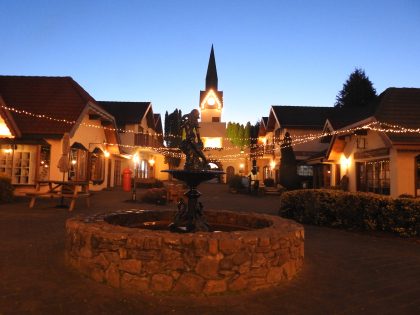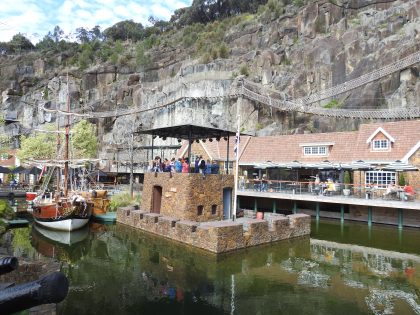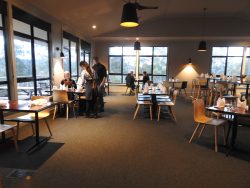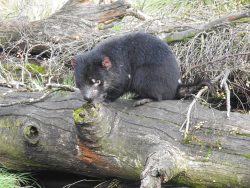
Swiss Village at Aspect Tamar Valley, Launceston
28th October
Arrive Launceston. Optional lunch at Penny Royal and visit to Cataract Gorge


5.00pm Registration, Aspect Tamar Valley (first conference venue)
5.45pm Welcome function followed by dinner
29th October
| 8.20am | Launceston | Chair: Ronda Green
;Welcome |
| 8.30am | Launceston | Opening of conference by Dr. Anne Hardy, University of Tasmania, and presentation Can technology help save wildlife? The Tourism Tracer Project. |
| 9.00am | Launceston | A delicate balance: meeting the needs of wildlife, tourists, operators and residents. Ronda Green (chair) |
| 9.20am | Launceston | Bloody Tourism: roadkill and tourists on Tasmanian roads: Elleke Leurs, University of Tasmania |
| 9.40am | Launceston | KEYNOTE: Meeting the needs of wild animals in captivity. Rosie Booth, WildlifeWarriors, Australia Zoo |
| 10.20am | Launceston | Morning tea. Display of Silent auction. |
| 10.50am | Launceston | Chair: Maree Treadwell-Kerr
KEYNOTE: What do the animals see as important? Joy Tripovich, Taronga Conservation Society |
| 11.30pm | Launceston | Let’s do an un-zoo : John Hamilton, Tasmanian Nature Society |
| 11.50pm | Launceston | KEYNOTE: Assessing animal welfare Nicolas de Graaf, Zoos and Aquaria Australia |
| 12.20pm | Launceston | Lunch,and opportunity to peruse poster papers and displays |
| 1.20pm | Launceston | Chair: Ronda Green
Roundtable: Philosophical. What lines can never be crossed? Under what circumstances can we never justify the use of animals in tourism? What alternatives could be acceptable under certain conditions? |
| 2.05pm | Launceston | Roundtable: Science. What do we already know about behavioural and ecological needs of animals that could be used to improve welfare and conservation? What are some of the important aspects we need more research on? |
| 2.50pm | Launceston | Final plenary discussion for the day |
| 3.05pm | Launceston | Close for day |
| 3.20pm | Launceston | Leave in coaches for Cradle Mountain |
| 5.30pm | Cradle Mountain | Arrive Cradle Mountain, possible stop along the way to view wild wombats grazing on native grasslands near forest. Checkin at various accommodations. Free evening. |

Cradle Mountain Hotel dining with a view
30th October
Early morning boardwalk (optional)
| 9.00am | opening, introduction to day |
| 9.10am | Chair: Georgette Leah Burns Asian elephant welfare and tourist satisfaction in ecotourism in Thailand. Emily Flower, Griffith University |
| 9.30am | Overcoming challenges faced by a biodiversity rich small island nation to use its natural capital (wildlife) as an economic commodity in a sustainable way Rahula Perera, Aarunya Vacations (Pvt) Limited, Sri Lanka. |
| 9.50am | Issues in developing best practice wildlife tourism in Asia. Noel Scott, Griffith Institute for Tourism, Griffith University |
| 10.10am | Elemental profiling to combat wildlife trafficking: identifying wild caught versus captive bred. Simin Maleknia, University of Technology Sydney, |
| 10.30am | Canine Scent Science in Australia – “Conservation’s Best Friend Too!” Amanda Hancock, Canarvan Canines (video) |
| 10.50am | Morning tea |
| 11.20am | Chair: Chantal Page
KEYNOTE: Working the Fine Line – Wildlife & People. Ian Morris, Coral Expeditions |
| 12.00 | Moonlit Sanctuary: presentation, encounter, training and enrichment activities, Blaire Bunter, Moonlight Sanctuary, Victoria |
| 12.20pm | Immersive Zoo Experience for Conservation Stewardship: Evaluating the Effectiveness of Taronga Zoo’s Tiger Trek in Driving Behaviour Change in Zoo Guests Ashley Kelly, Kansas University, USA |
| 12.40pm | Can Glow-worm Ecotourism Lead to Increased Conservation Knowledge and Positive Intentions Towards Glow-worms in the Wild? Robin Rowland, CedarCreek Estate Glow Worms |
| 1.00pm | Lunch |
| 2..00pm | Chair: Maree Treadwell-Kerr
Playing with nature: Gamification of engaging eco-tourism clients with nature. Lindy Orwin, Questagame and Cooloola CoastCare. |
| 2.20pm | Managing human and fur seal interactions in Tasmania: Leah Burns, Griffith University |
| 2.40pm | Look, I swim with sharks! Risk Perceptions and Social Media use in close encounters with marine wildlife. Chantal Pagel, Auckland University of Technology, NewZealand |
| 3.00pm |
afternoon tea |
| 3.25pm | Chair: Ronda Green
Roundtable: Action. How do we start implementing some reasonable and workable compromises between needs of animals and tourists, bearing in mind also the needs of operators and local residents, especially in regional or poverty areas? |
| 4.05pm | Final plenary discussion for the day |
| 4.15pm | Close of today’s formal presentations and discussions |
| 4.20pm | AGM iof WTA. All welcome,but only financial members can vote |
| 4.50pm | Minibus pickups for Devils@Cradle, enter 5.00pm to view devils and quolls in large captive breeding enclosures, and hear a presentation by Wade Anthony on research on and rehabilitation of Tadmanian devils, eastern quolls and spotted-tailed quolls. REMEMBER TO WEAR WARM CLOTHES! |
| 6.15pm | Wild wombat watching near Devils@Cradle |
| 6.30pm | Transport to Cradle Mountain Hotel |
| 7.00 pm | Conference dinner |
| 10.00 pm | Minibus transport back to other accommodations |

Tasmanian devil at Devils@Cradle,
31st October
| 8.40am | opening for day |
| 8.50am | Chair: Simin Maleknia
KEYNOTE: Wildlife Wonders – tourism for community and conservation Lizzie Corke, Conservation Ecology Centre, CapeOtway,Victoria |
| 9.30am | Cruise ships, climate change, citizen scientists and conservation heroes. Ingrid Albion, Tasmanian Parks and Wildlife Service |
| 9.50am | Great Australasian bat tourism trail, balancing bat conservation with visitor expectations Maree Kerr (Griffith University) and Sera Steves |
| 10.10am |
Issues and possibilities on facilities of iconic animal in World Natural Heritage candidate area. Junko Oshima, University of the Ryukyu, Japan
|
| 10.40am | . morning tea |
| 11.10am | Chair: Ronda Green
Plenary discussion on future actions: How do we best distribute current knowledge to the tourism industry, conservation managers and governments? What are some important knowledge gaps we need our researchers to address? |
| 11.45am | Discussion on major messages from the conference for a press release. General wrap-up. |
| 12.00noon | Close of conference |
| 12.05pm | Lunch |
| 1.00pm | buses leave for Launceston, to arrive at airport by 400pm |
1st-5th November
Poster paper:
Managing Wildlife Tourism for Sustainable Community Economic Development: the Case of Ruhuna National Park (Yala), Sri Lanka. Dinesha Senarathna (via video), Ph.D. candidate at Auckland University of Technology, New Zealand TBC
Post-conference tours see tours page

En route to Cradle Mountain.
